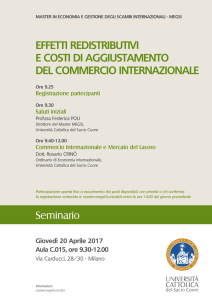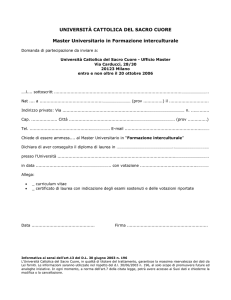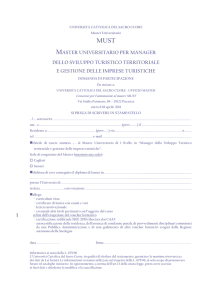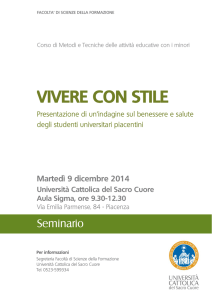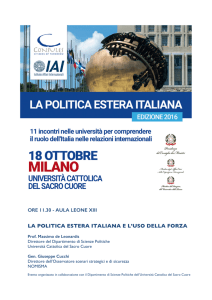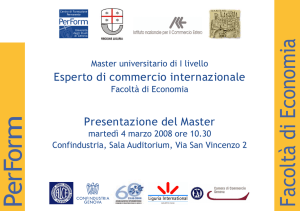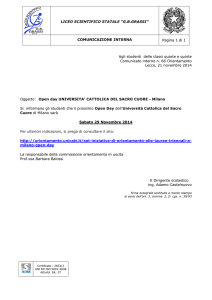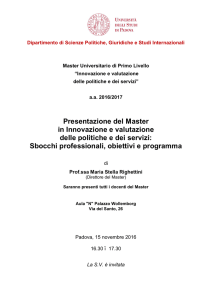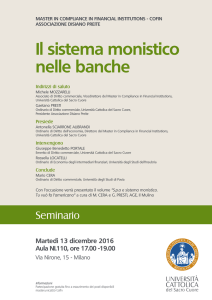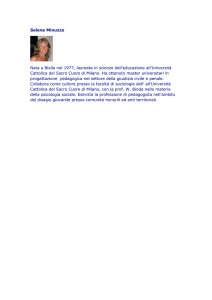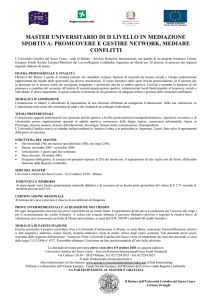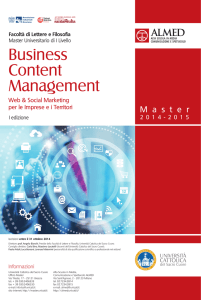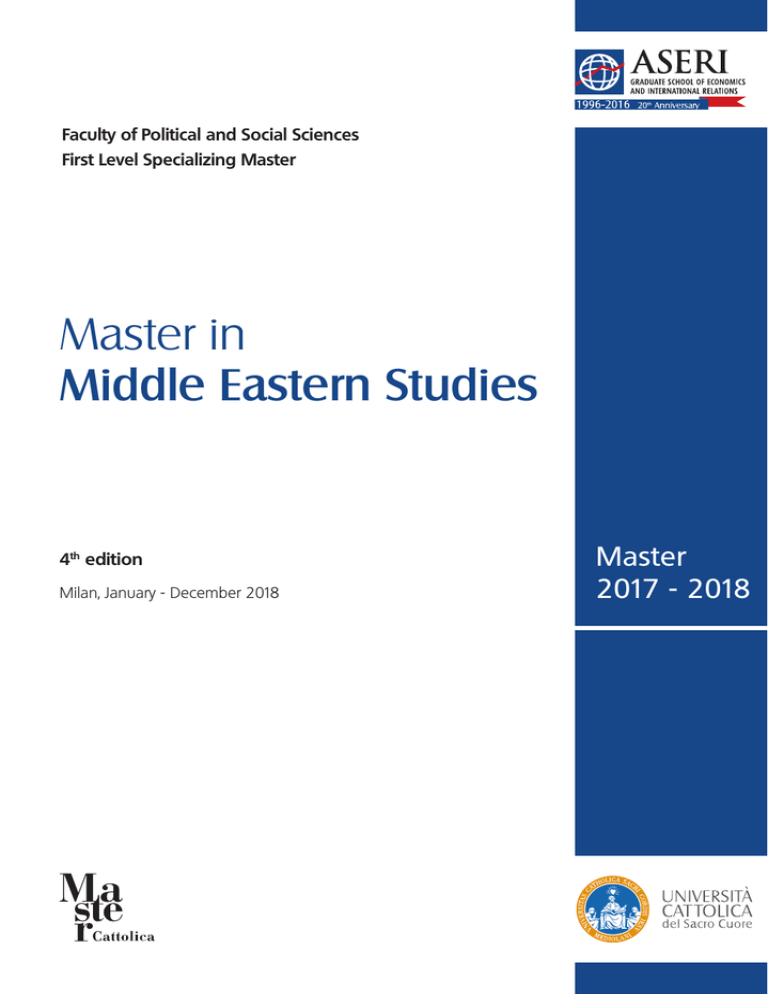
Faculty of Political and Social Sciences
First Level Specializing Master
Master in
Middle Eastern Studies
4th edition
Milan, January - December 2018
Master
2017 - 2018
“The Master in Middle Eastern Studies - MIMES
is tailored for graduates of various disciplines
and backgrounds, who are interested in
obtaining a better knowledge of the Middle
East region, taking into account its socialhistorical complexity and cultural plurality. The
program aims to offer solid historical, political
and institutional perspectives of the current
domestic, regional and international dynamics affecting the stability of
the region, as well as a critical outlook on current debates over the
Middle East.
Renowned professors from the Middle East, Europe and the U.S. are part
of its distinguished international Faculty, whose members have generally
a long experience as field-researchers or in situ professionals.
MIMES offers a holistic approach to favour a better understanding of the
Middle East complexity, with many voices from within the region, since
Middle East cannot be just an “object” of study.”
Prof. Riccardo Redaelli, MIMES Director
Goals
This innovative program aims to guide the students across this diverse and fascinating region, which, since
decades, is at the core of the geostrategic interest of the international system. The program mainly focuses on
the contemporary period, through a multi-disciplinary approach ranging over international relations, geopolitics,
conflicts and security, economy and energy. Nonetheless, specific sections are devoted to the analysis of the
historical and religious foundation of the modern Middle East, from the birth of Islam to the evolution of Islamic
thought, law and economy. MIMES analyses in details infra-regions and inter-regions peculiarities and relations,
from Maghreb to Central-Southern Asia, encouraging a comparative and holistic area studies approach.
Participants profile
The Master’s program is designed for:
.
Young graduates throughout the world with a strong interest in the wider Middle East and willing to
specialize their competences.
.
Professionals who aspire to deepen their knowledge on Middle East socio-cultural peculiarities and its
political-economic dynamics.
The maximum number of admitted students is limited to 25, to ensure the high quality of learning and
interaction.
Placement opportunities
MIMES provides graduated students with a detailed, comprehensive knowledge of the wider Middle East, beneficial
to undertake a number of different careers, consistently with their previous training and experience within:
.
.
.
.
.
international institutions
private companies
NGOs
research centers and area studies
media networks
Curriculum
1st Level
Methodological
premise: discourse
and debate on the
Middle East
Maghreb
History of the
Middle East
Mashreq
Politics in
contemporary
Middle East and the
current International
Relations context
Religion, society
Islamic law and
and thought in
economy
the Islamic Middle
East
2nd Level
Political and
juridical
terminologyglossary in Arabic
Middle East within
the 20th century
international order
Sub-Saharan Africa South-West Asia and the Gulf Central-Southern Asia
3rd Level
Global security:
jihadism, violent
activism, conflicts
and nuclear
proliferation
Gender, ethnoreligious
diversity and
pluralism in the
Middle East
4th Level
Post-conflict
institutionbuilding and
human security
Energy and
geopolitics of
resources
Contemporary
economic trends
PROJECT WORK
5th Level
INTERNSHIP (OR LANGUAGE COURSE)
MIMES is articulated in five complementary levels, fostering multidimensional training, cross-fertilization and
integrating scientific methodologies and operative competences.
1st level - History, power and institution: the
conceptual foundation of the Middle East
The first level provides students of different academic
backgrounds with a broad knowledge of the Middle
East, the rise of Islam and its characteristic, with an
accurate analysis of the historical evolution of the
region and its role within the international system. A
dedicated course will offer an analysis of the political
and juridical terminology and a glossary in Arabic.
2nd level - Sub-regional contexts
Students acquire a detailed knowledge of different
sub-regions of the wider Middle East, focusing on
their peculiarities and connections with regional
and international geopolitical trends. The program
encourages the adoption of a comparative methodology,
emphasizing the conceptual dichotomy continuity/
change, within an historical-political narrative.
3rd level - Thematic and Contemporary Issues
This phase offers a wide portfolio of specializing
courses on the most relevant political, geoeconomic
and security events and dynamics contributing to the
current Middle Eastern unbalances. The program aims
to underline the role of the region within the larger
international system, and the lesson learnt during the
post-Cold War period.
4th level - Project work
In order to get the final diploma of the Master in
Middle Eastern Studies students are required to write a
personal project work consisting of an interdisciplinary
and critical analysis of a specific issue related to Middle
Eastern affairs. It is suggested to connect the project
work to the internship experience. Scientific knowledge
acquired through the Master’s courses constitutes
the scientific background necessary to develop the
research project.
5th level - Internship or language course
The Master’s program is completed with an internship
in Italy or abroad within an institution whose mission
and activities are consistent with the Master’s program.
This gives the student the invaluable opportunity to test
and strengthen the competencies acquired during the
Master’s program and it usually lasts three months.
As an alternative, students may choose to attend an
Arabic, Persian or Turkish language course (the course
will have to be positively evaluated by the Master’s
Direction and additional fee depending on the
organizing institution may occur).
Students will receive support and tutoring for their
internship research, specifically concerning CVs and
cover letter preparation, vacancies research and
internship announcements indication.
Alumni
“At the end of this path, I think the aspect of the course that I appreciated the most- the
one I remember more dearly and I will certainly miss- was the amazing opportunity
to be lectured by experts coming not only from very different geographical, but also
professional backgrounds. I could see the enthusiasm and the involvement in the eyes
of many among them when they told us about their direct experiences in Middle
Eastern countries. Their words guided us in the discovery and exploration of this
region, and were also fundamental to foster our interest and to give a clearer face to
our hopes and expectations. “
Lorena Stella Martini, MIMES student 2015-2016, Italy
“As a graduate from the Master in Middle Eastern Studies 2016, I can definitely describe
2016 as the most inspiring, eye-opening and challenging year so far. During my time
at ASERI, academic discussions with a variety of experts in a diversified environment
were accompanied by the development of what I know will be friendships for a
lifetime. The Master gave me the opportunity to intern in Tel Aviv, Israel, a goal I had
wanted to achieve for a long time. Because of this specializing Master, I feel capable
of pursuing an international academic career.”
Marie Figoureux, MIMES student 2015-2016, Belgium
“Every class was an occasion for us to learn, to think, to ask, to wonder, to discuss, to
question. All the subjects that we studied were like pieces of an harmonious puzzle:
we were asked to put all of them together, in a way that at the end of the day it could
finally make sense. What I appreciated most is the approach of this Master: we have
been taught the importance of having a critical attitude and always being curious,
challenging stereotypes, refusing simplistic views, looking beyond the end of one’s
nose to understand such a complex and diverse reality like the Middle East. This is
exactly what we were looking for. With different backgrounds and nationalities and
with a specific reason for being here, each of us gave something to the others, adding
value to this experience. This Master and my internship enriched me, made me a
stronger person, improved my critical thinking, further opening my mind. “
Libera Chiara D’Acunto, MIMES student 2014-2015, Italy
Faculty
Prof. Riccardo Redaelli, MIMES Director, Università
Prof. Andrea Pin, Università degli Studi di Padova
Cattolica del Sacro Cuore
Dr. Andrea Plebani, Università Cattolica del Sacro
Dr. Giuseppe Acconcia, University of London and Il
Cuore
Manifesto
Prof. Alessandro Romagnoli, Università di Bologna
Prof. Ibrahim Al-Marashi, California State University
Prof. Mahmood Sariolghalam, Shahid Beheshti
San Marcos
University of Tehran
Prof. Paolo Branca, Università Cattolica del Sacro
Avv. John Shehata, Bonelli Erede and Nuovo Istituto
Cuore
di Business Internazionale-NIBI
Dr. Marina Calculli, St. Antony’s College, University of
Ms. Valeria Talbot, ISPI
Oxford
Prof. Oktay Tanrisever, Middle East Technical
Prof. Massimo Campanini, Università degli Studi di
University, Ankara
Trento
Amb. Roberto Toscano, Barcelona Center for
Dr. Andrea Carati, Università degli Studi di Milano
International Affairs - CIDOB and University of Madrid
Dr. Claudia Castiglioni, Università degli Studi di
Dr. Massimiliano Trentin, Università di Bologna
Milano and Sciences Po Parigi
Dr. Raul Caruso, Università Cattolica del Sacro Cuore
Dr. Antonio De Lauri, Chr. Michelsen Institute in
Bergen
Past internships
Prof. Barbara De Poli, Università Ca’ Foscari Venezia
ActionAid - Italy
Prof. Martino Diez, Fondazione Internazionale OASIS
Ahlan World - Morocco
and Università Cattolica del Sacro Cuore
ASSPI - Associazione per lo sviluppo del sistema
Prof. Wael Faruq, American University in Cairo
di protezione internazionale - Italy
Prof. Ersilia Francesca, Università degli Studi di Napoli
Child and Youth Finance International - Netherlands
L’Orientale
CIPMO - Centro Italiano per la Pace in Medio
Dr. Gennaro Gervasio, Università degli Studi Roma Tre
Oriente - Italy
Prof. Mehran Kamrava, Georgetown University’s
Consulate of Ecuador - Italy
School of Foreign Service in Qatar
Friedrich Naumann Foundation for Freedom -
Prof. Bahgat Korany, American University in Cairo
Turkey
Mr. Paolo Lembo, World Green Economy Organization
ICDT - International Center for Democratic
Prof. Marco Lombardi, Università Cattolica del Sacro
Transition - Hungary
Cuore and ITSTIME
Fondazione Internazionale Oasis - Italy
Prof. Elena Maestri, Università Cattolica del Sacro Cuore
Fondazione Mission Bambini Onlus - Italy
Dr. Paolo Maggiolini, Università Cattolica del Sacro Cuore
ISPI - Istituto per gli Studi di Politica Internazionale
Prof.
- Italy
Maurizio
Martellini,
Landau
Network
Fondazione Volta -LNCV and Insubria Center on
ITSTIME - Italy
International Security -ICIS
LechLecha - Italy
Dr. Francesco Mazzucotelli, Università di Pavia and
Musawah - Malaysia
Università Cattolica del Sacro Cuore
NENA News - Italy
Ms. Masoumeh Mirsafa, Politecnico di Milano
OCHA - UN Office for the Coordination of
Prof. Massimo Papa, Università di Roma Tor Vergata
Humanitarian Affairs - Switzerland
Prof. Vittorio Emanuele Parsi, Università Cattolica del
Perigeo NGO - Italy
Sacro Cuore
Transparency International - Germany
Dr. Nicola Pedde, Institute for Global Studies
Windows for Peace - Israel
Prof. Aldo Pigoli, Università Cattolica del Sacro Cuore
At a glance
Program Type
. First Level Specializing Master (“Master Universitario”)
Language of instruction
. English
Duration
January 2018-December 2018:
. January - June: classes and exams
. July-December: internship and project work
Total ECTS:
. 60
Entry requirements
. Bachelor’s degree
.
English proficiency
.
Strong motivation
Application deadline
. October 30, 2017
Applications will be evaluated in an ongoing process. Since the Master
has a limited number of places, early applications have a greater chance
of being successful.
Application procedure
Applicants will be required to submit an online application form along with
their supporting documents:
. Copy of Bachelor or Master’s
. Application essay (available
Degree
online)
. Transcripts of Bachelor or
. At least one academic or
Master’s Degree
professional letter of reference
. Curriculum vitae
. Copy of passport/ID
More information: aseri.unicatt.it/mimes
Tuition fee:
. € 7,500
Partial tuition fee scholarships available
Contacts
Università Cattolica del Sacro Cuore
ASERI - Graduate School of Economics and International Relations
Via San Vittore 18, 20123 Milano - Italy
Tel. +39 02 7234 8310
aseri.unicatt.it/mimes
[email protected]

